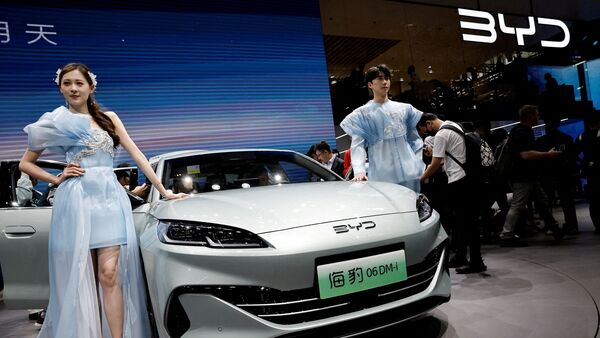
Joe Biden Plans Tariffs on Chinese Electric Cars to Stop Imports
By Sumaiya | Published | No Comments
- Earlier this week, the US Commerce Secretary warned that the Biden administration could ban or ban Chinese EVs.

President Joe Biden’s administration is poised to unveil a sweeping decision on China tariffs as soon as next week, which are expected to target key strategic sectors while rejecting across-the-board increases sought by Donald Trump, people familiar with the matter said.
The decision is the culmination of a review of so-called Section 301 tariffs that begins in 2018 under Trump. The new tariffs will focus on industries including electric vehicles, batteries and solar cells, with existing levies largely maintained. An announcement is scheduled for Tuesday, two of the people said.
While the decision may be delayed, it still represents one of Biden’s biggest moves in economic competition with China. It builds on his call last month to raise tariffs on Chinese steel and aluminum and to formally launch new investigations into China’s shipbuilding industry.
Economic recession
Chinese President Xi Jinping’s strategy to boost manufacturing to stave off an economic slowdown at home has sparked alarm abroad. US and European Union leaders have warned Beijing that excessive state subsidies have fueled a flood of cheap exports that threaten jobs in their markets.
The US standing up to China’s “unfair economic practices and industrial overcapacity,” Biden said last month. “I’m not looking for a fight with China. I’m looking for competition, but fair competition.”
Both Biden and Trump are seen as tough on China as they head toward an expected rematch in the November election.
Trump has promised to raise tariffs on China across the board if re-elected, pledging a 60% tax on all Chinese imports. But many Democrats have rejected that approach, saying it would raise prices for US consumers already struggling with inflation.
Also Read: Range Rover SUV buyers in this country offered insurance cover after theft incidents by carmaker
During the last Trump administration, Washington and Beijing were embroiled in a trade war, with China attempting to inflict certain pain in the American heartland by targeting agricultural exports.
US Senator Chuck Grassley, Republican of Iowa, said Thursday evening that he expects China to respond. “We know how China reacted when Trump imposed tariffs,” Grassley said. “They hit agriculture with it. I’m not sure China will hit agriculture the same way they did under Trump, but they’re going. Hit back.”
Also see: BYD Seal First Drive Review
Strategic Tariff
Biden’s announcement will be formally implemented by the office of US Trade Representative Catherine Tay.
The review of tariffs began in 2022. Tai said in an interview last month that she expects that assessment to be concluded “soon” and that the administration is looking for ways to make the tariffs more strategic and effective.
The move comes after Biden proposed new 25% tariffs on Chinese steel and aluminum last month, part of a series of moves to boost the American steel sector and attract its workers in an election year. That move was largely seen as symbolic, as China currently exports little of any metal to the US.
The full range of existing duties covers imports from industrial inputs, such as microchips and chemicals, to consumer merchandise including apparel and furniture. Trump imposed the first tariffs in 2018 citing Section 301 of the Trade Act of 1974.
For years internal divisions prevented Biden’s team from coming to a consensus on what to do about the tariffs. Some officials, including Treasury Secretary Janet Yellen, have argued that easing restrictions on household goods could help ease US inflation.
While the Biden administration considered the political implications of the changes to the tariffs, USTRA began a legally required formal review of their impact in late 2022. In the absence of such an assessment, the restrictions would have started to expire automatically in mid-2022.
Under Trump’s leadership, Washington and Beijing reached a so-called phase one agreement in early 2020. In return, China pledged to end intellectual-property theft and buy energy, farm and manufactured goods and services by December 2021. China declined. More than a third shorter than his promises.
Biden’s tariff move comes after his nation’s tumultuous relationship with China stabilized in recent months amid a flurry of diplomatic engagement. After the US president met his Chinese counterpart in California last November, Biden said they had achieved “real progress”.
Date of first publication: 10 May 2024, 09:06 AM IST
| Denial of responsibility! Thelocalreport.in is an automatic aggregator around the global media. All the content are available free on Internet. We have just arranged it in one platform for educational purpose only. In each content, the hyperlink to the primary source is specified. All trademarks belong to their rightful owners, all materials to their authors. If you are the owner of the content and do not want us to publish your materials on our website, please contact us.The content will be deleted within 24 hours. |





